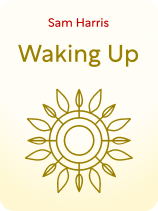

This article is an excerpt from the Shortform book guide to "Waking Up" by Sam Harris. Shortform has the world's best summaries and analyses of books you should be reading.
Like this article? Sign up for a free trial here.
Is it possible to have spirituality without religion? If so, how? Why would you want to pursue this?
Sam Harris is known for encouraging skeptics to confront religion. In 2017’s Waking Up, he lays out a reason-based approach to spirituality that’s rooted in what science and meditation teach about the workings of the human mind.
Read more to learn what secular spirituality means and why Harris recommends it.
Secular Spirituality
To talk about spiritual experiences within the realm of a rational, scientific worldview, the first step is to define what “spirituality” means in this context. For Harris, spirituality is the process of exploring your consciousness in a way that dispels the illusion that your existence is defined by your thoughts and feelings. Such explorations can also include achieving states of consciousness outside the realm of normal experience. Harris discusses why such a practice is desirable, how to separate spirituality from the confines of religion, and why out of all the major faiths, Buddhism provides the most practical roadmap to having spiritual experiences without the baggage of superstition and dogma.
In his exploration of secular spirituality, Harris starts from a simple foundation—everybody just wants to be happy. Unfortunately, on the “hedonic treadmill” of our materialistic culture, peace and contentment are always somewhere in the future while you try to run away from the pain in your past. Spiritual endeavors, such as prayer and contemplation, are an attempt to break yourself out of this cycle, bringing your awareness into the here and now. This is the practice of mindfulness—the deliberate choice to focus your awareness on the present moment and experience it without judgment. Happiness and tranquility can only be found in the present because the present moment is all you can actually experience.
(Shortform note: While many writers, including Harris, conflate the practices of mindfulness and meditation, by some definitions they’re two different things. In Hyperfocus, Chris Bailey argues that mindfulness means being aware of everything going on around and inside you, whereas meditation entails narrowing your attention to one thing. In The Power of Positive Thinking, Norman Vincent Peale describes the act of prayer in a similar way—as a method to focus your spiritual energy on one particular problem or need. In Mindfulness in Plain English, Bhante Gunaratana resolves the mindfulness/meditation dichotomy by explaining that mindfulness should be your ultimate aim, while meditation is the practice for achieving that goal.)
Practicing mindfulness (in the form of meditation) teaches three simple truths:
- Your thoughts shape your subjective experience.
- Positive emotions are skills you can train.
- Your “sense of self” is an illusion.
(Shortform note: The first two of Harris’s truths are in line with the beliefs of Greek philosophers of the Epicurean and Stoic traditions. As Derren Brown explains in Happy, these ancient schools of thought teach that your experience of life is entirely dependent on how you frame it in your mind, though putting this idea into practice requires retraining how you think and react in difficult situations. Nevertheless, the ancient thinkers may have disagreed with the third of Harris’s statements. In Meditations, Stoic philosopher and Roman emperor Marcus Aurelius defines the self as being composed of the body, the spirit, and the intellect, of which he places the intellect as the most important of the three.)
According to Harris, it’s the last of these tenets—that selfhood is illusory—that lies at the heart of spirituality. A spiritual experience is the feeling of transcending your limited existence, freeing your awareness from the constant grind of anxiety, longing, sadness, and pain. Throughout history, many people have felt such transcendence, usually in the context of a religion that attributes moments of rapture to divine origin. However, since people of all faiths have had similar transcendent experiences, even between religions that directly contradict each other, then, logically, some factor outside of religion must be the source of the spiritual experience.
(Shortform note: For many people, there may be more to the spiritual experience than just transcendence of the self. In The Book of Joy, Archbishop Desmond Tutu and the Dalai Lama discuss the intersection of their different faiths and find that common values such as humility, humor, forgiveness, and gratitude are also essential to a spiritual life. Their views overlap with Harris’s transcendence of the self in that they both insist on the importance of developing a perspective of the world beyond your own instead of being preoccupied with yourself.)
The Buddhist Approach
If we discard any supernatural causes, then the common ground shared by anyone who’s had a spiritual experience is the human condition itself—namely, cognition and emotion. This shared human experience is where we find the universal truths that various opposing religions have uncovered. Harris says that while most religions hide the path to these truths behind a maze of superstition, ritual, and dogma, Buddhism approaches spirituality with an almost scientific focus on experiment and observation, which opens a path for nonbelievers to experience a transformation of consciousness without paying heed to any supernatural claims.
To be fair, Buddhism makes supernatural claims just like any other religion, such as the existence of spirits, reincarnation, and that some Buddhist adepts have extranormal powers. Nevertheless, Harris points out that when stripped of its mythological framework, Buddhism has an empirical core—a practical process to bring your awareness into the present moment so that you can realize that your thoughts and emotions don’t define your existence. Instead of asking you to take this idea on faith, Buddhism makes the testable assertion that the more you practice meditation, the more you’ll be able to free yourself from suffering.

———End of Preview———
Like what you just read? Read the rest of the world's best book summary and analysis of Sam Harris's "Waking Up" at Shortform.
Here's what you'll find in our full Waking Up summary:
- Why those who reject religion are missing out on something crucial
- A reason-based approach to spirituality that’s rooted in science and meditation
- What science and theology have to say about the soul and the mind






